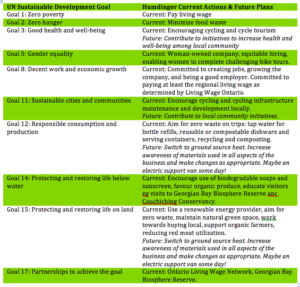Sustainability has been part of the vision for Humdinger since day one. However, if the truth be told, I did not initially know what that meant or how to implement it. Since Humdinger’s inception in late 2017, I have learned a lot about sustainability, and what is and is not feasible to implement in the current context. As part of our sustainability journey, we were certified recently as a living wage employer by the Ontario Living Wage Network. I am so proud of this! Now seems like a good time to talk about sustainable business practices and sustainable development in general, and what I am trying to accomplish with Humdinger Bicycle Tours.
A commonly used definition of sustainability, from The Bruntland Report, is meeting the needs of the present without compromising the ability of future generations to meet their own needs. This video by Alex Magnin provides a great overview. Unsustainability comes from environmental, economic, and social causes. The main causes are over-extraction materials from the earth, accumulation of stuff that goes to landfill or pollutes the environment, inhibiting nature’s cycles, and not allowing people to meet their basic needs. The idea is to balance extraction of materials, which create jobs and stuff and thereby economic growth, with reduction of pollution and irreversible damage to nature. As we all know, this is an ongoing challenge for everyone, everywhere. And I believe we all know that there are no easy solutions.
The United Nations lists 17 sustainable development goals that include socio-economic concerns such as zero poverty, zero hunger, and decent work and economic growth; and environmental concerns such as responsible production and consumption, and protecting and restoring life in water and on land. At Humdinger, I believe that 10 of the 17 goals are relevant to us. The table below lists the relevant UN sustainable development goal and our current actions and future plans.
 The upshot? Running a small business comes with huge financial and time pressures, and it is easy to cave in to cheaper/faster solutions that do not move sustainable development goals forward. And sometimes one makes a choice to do a less sustainable thing to stay in business – which then in turn may allow the fulfillment of Goal 8, providing decent work and economic growth. Ay, there’s the rub. It is a balancing act. I believe it is important to declare oneself as working towards sustainability, and to then be transparent about which aspect of one’s business fit the bill and which need more work. A big concern I have is that we operate a fossil-fuel burning support vehicle. I would love to have an electric van for supporting cyclists, but there is currently nothing suitable available. When something suitable becomes available, it may not be affordable. But it remains a long-term goal.
The upshot? Running a small business comes with huge financial and time pressures, and it is easy to cave in to cheaper/faster solutions that do not move sustainable development goals forward. And sometimes one makes a choice to do a less sustainable thing to stay in business – which then in turn may allow the fulfillment of Goal 8, providing decent work and economic growth. Ay, there’s the rub. It is a balancing act. I believe it is important to declare oneself as working towards sustainability, and to then be transparent about which aspect of one’s business fit the bill and which need more work. A big concern I have is that we operate a fossil-fuel burning support vehicle. I would love to have an electric van for supporting cyclists, but there is currently nothing suitable available. When something suitable becomes available, it may not be affordable. But it remains a long-term goal.
In terms of longer-term goals, it turns out that sustainability is just scratching the surface in terms of treating our planet lovingly. While sustainable business practices are a marked improvement over business as usual, there are visionaries speaking about regenerative practices. Sustainability suggests not making things worse, whereas regenerative means making them better. I love this idea – along the lines of picking up someone else’s garbage at the park, and leaving the space better than you found it, but on a much larger scale. Hopefully in a couple of years I can write a post about our journey towards regenerative practices!
Much love to everyone who is working to make things better for earth and earthlings.
